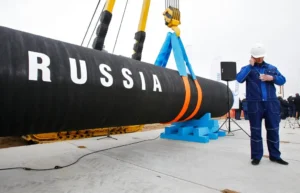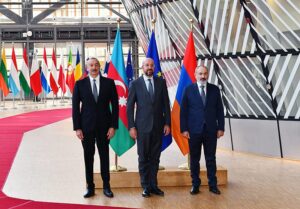Photo: Armenian Prime Minister Pashinyan and Russian President Putin meeting in 2018 – Wikimedia Commons
Armenia’s government has sent the founding treaty of the International Criminal Court, also known as the Rome Statute, to the country’s parliament for ratification. If the parliament reacts positively to the treaty, the government will ratify it. This would mean Armenia will have to adhere to the international arrest warrant for Russian President Putin over war crimes committed by Russia in Ukraine, which would put the already troublesome relationship between the two countries further at stake. What is traditional Russian ally Armenia playing at?
If Putin visits Armenia when it has ratified the treaty, the authorities will have to extradite him to the ICC. Since Armenia’s Constitutional Court stood positively towards ratification already since last March, Moscow has warned Yerevan several times already not to do so. Although it is not clear yet whether Armenia will ratify the treaty as a whole or will make exceptions for Russian officials, tension is definitely rising.
Developments in Nagorno-Karabakh
Tension has been rising for a longer time between Moscow and Yerevan. Pointing to the blockade of the vital Lachin-corridor to the Karabakh region (making it impossible for aid organisations to deliver food and fuel), Armenia has accused Russia it failed to protect Armenia in its Nagorno-Karabakh conflict with Azerbaijan. Traditional ally Russia has been leading the peace process and has brokered a ceasefire between the two South Caucasus countries, maintained by Russian peacekeepers. However, Russia has proved to be unable to maintain that ceasefire, agreed upon in late 2020, and violations of it are omnipresent ever since. Armenians are disappointed in Russia that it failed to support Armenia sufficiently during its war with Azerbaijan.
In contrast to Azerbaijan, Armenia is member of the Collective Security Treaty Organisation, a military alliance of six post-Soviet states led by Russia. This is one of the partnerships that confirms the relation between the two countries. But Russia has been backing Azerbaijan’s claims to Nagorno-Karabakh lately, reflecting growing tensions. Armenia’s prime minister Pashinyan has said it was a mistake to rely solely on Russia to guarantee security in the border region. “99,999 per cent of Armenia’s security architecture is linked to Russia”, said Pashinyan. Now that Russia is in need of arms and ammunition itself (to use in Ukraine), they seem to be distracted and unable to meet the required needs for security. With Russia not meeting Armenia’s expectations regarding the peacekeeping mission, it seems to be in search of other partners who can meet their security needs, strengthening its ties with the West.
Standing up against the bear
This development is seen with more former Soviet Union states who are more and more distancing themselves from Russia in recent years, especially since its invasion in Ukraine. Countries have seen how Russia’s intentions can develop and realized what it is capable of. Several of what used to be Russia’s closest allies, do not support what Moscow calls its ‘special military operation’ in Ukraine. Making Russia not longer able to influence and rely on their former Soviet Republics as they have been doing ever since the fall of the Soviet Union.
Strengthening ties with the West
Back to Armenia. A survey held in Armenia shows the deteriorating relations with Russia. As opposed to 2019 when 93% of Armenians considered relations with Russia “good” and just 6% as “bad”, those numbers have changed to 50 and 49% respectively in 2023. In exchange, Armenians slightly consider Iran and France as more important security partners than Russia. As to political partners, France, Iran and the United States are considered the top three most important ones, according to 75, 67 and 52% respectively. Russia comes in fourth on the list with 50%. A 2022 survey found that the EU is more trusted than its Eurasian equivalent (EEU) and the CSTO.
Its move towards the West has been taking hold since the pro-European Velvet Revolution in 2018 and accelerated since 2020 and especially February 2022. The EU, for example, has been present for months with a civilian mission, observing and reporting on the security situation along the Armenia-Azerbaijan border – a task formerly executed by Russia. Besides, concrete steps have been taken by Yerevan to distance itself from the CSTO. A declaration on measures to provide assistance to Armenia was refused to sign, Armenia renounced to choose the CSTO’s new deputy secretary general, and of course the ICC treaty was sent to parliament for consultation preparatory to ratify it. Most strikingly, Armenia is about to prepare exercises with US troops, to train peacekeepers of its own.
Whether Armenia will ratify the ICC treaty any time soon, the question is what it will do to the already fragile relationship between Armenia and Russia. One thing is certain, it won’t come as a complete surprise based on the developments in Armenia in recent years. Armenia has made clear it wants to take steps forward, to a better, more open future, and not linger in history.
Written by Timon Driessen



